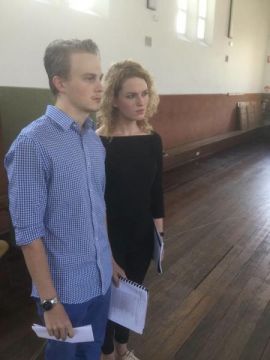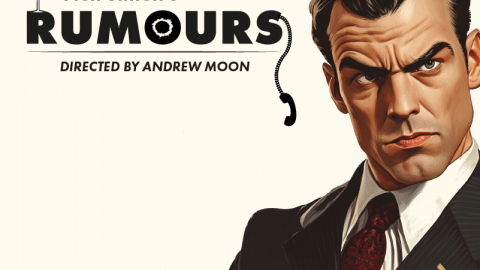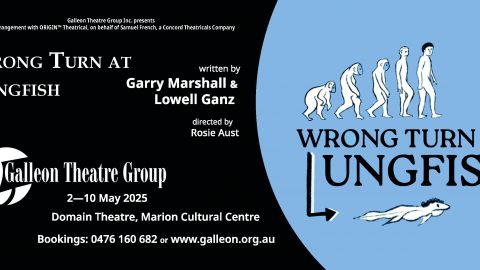Hamlet Returns to Adelaide’s Independent Theatre Company
Sixteen years ago Adelaide’s Independent Theatre Company produced the classic Shakespeare tragedy Hamlet, to critical acclaim. Now, in April 2016, Artistic Director Rob Croser is to direct the play again, but with a very different approach to casting the conflicted prince at the heart of the story. Lesley Reed reports.
Audiences have been enthralled by Hamlet for four hundred years, yet what is arguably William Shakespeare’s most famous play is also one of his most difficult to perform.
In recent times, all the prominent actors playing Hamlet in London have been men in their late thirties or early forties, such as Jude Law, David Tennant and Benedict Cumberbatch.
Perhaps the difficulty and complexity of the role is why mature actors have always played the Danish prince, despite the fact that there are clues in the narrative to indicate Hamlet was very young indeed, perhaps even in his late teens.
This anomaly has not escaped Rob Croser, Artistic Director of Independent Theatre Company, an Adelaide company that produced Hamlet a decade and a half ago and is about to present the epic tragedy again.
“As you know, we did Hamlet sixteen years ago, with a brilliant actor, Nick Opolski, as Hamlet,’ said Rob. “Nick was thirty, the age Hamlet is described as being in one sentence in the Act V Gravedigger's Scene.”
Interestingly though, Croser has been mulling over the fact that the first published version of the play, the so-called ‘Bad’ First Folio, described Hamlet as a teenager.
Croser believes this demonstrates Shakespeare originally intended Hamlet to be a young person and that it’s likely that the Act V ‘thirty’ line was inserted because Shakespeare's first Hamlet, Richard Burbage, was a mature man.
“He is described as a student,” said Rob. “He has come home from the University of Wittenberg to attend the funeral of his suddenly dead father. It seems odd that a thirty-year-old would still be at university. He finds his mother remarried to his uncle, who has been made king ahead of himself. It makes much more sense that the Danish nobles would consider an eighteen-year-old too immature to take over the reins of the kingdom. It would be difficult for them to say that of a thirty-year-old.”

Croser also believes Hamlet's reactions and emotions are very much more those of an adolescent than a mature man. “His musings on the meaning and purpose of life and death work better if he is young,” Croser said.
“His sense of betrayal by Ophelia also seems much more that of a young lover – a Romeo – than of a mature man,” he said. “So, for all these reasons, I thought that if I ever got the chance to do the play again, I would love to explore it from the point of view of a very young man.”
That opportunity has arrived at last in the shape of experienced young actor Will Cox. Independent Theatre will once again present Hamlet, from April 8-16 this year, with Will as Hamlet.
“I have watched Will Cox develop with the company since his first performance at age fourteen as Jem Finch in To Kill a Mockingbird, through Huckleberry Finn, My Boy Jack, The Playboy of the Western World and massive roles in The Magnificent Ambersons and last year's The Great Gatsby,” said Rob Croser. “Will is already surpassing all my expectations and totally confirming my belief in the play's added poignancy and tragedy when the central character is a juvenile. All I've needed to do is change that one line in Act V that talks of him being born thirty years ago.”
Of course it has meant that many of the rest of the cast needed to be younger than is often the case, too. In addition to Will Cox as Hamlet, Madeleine Herd is Ophelia, Paul Rodda is Claudius, David Roach plays Polonius, Bronwyn Ruciak is Gertrude and Shedrick Yarkpai is Horatio. Other cast include Jett Zivkovic, Jordan Carling, Allen Munn, Mark Mulders and Stephen Schofield.
The age of Hamlet in Independent Theatre’s production is a dramatic shift from the traditional, but Croser has also made another change.
“I have decided to remove the international politics completely, as is often done in modern productions,” he said. “I find that the whole Fortinbras/Norway subplot is almost incomprehensible in the theatre.”
To Croser, the personal tragedy and history is what makes the play so compelling and powerful.
“The fact that by the end of the play two whole families have been wiped out-Old Hamlet, Young Hamlet, Gertrude and Claudius, as well as Polonius, Ophelia and Laertes, all as a result of Claudius murdering his brother, seems to me to be the tragic spine of the play,” he said.
Croser wishes to focus on the young philosopher-prince, happily studying in Germany when he is suddenly called home to attend his father's funeral, only to find that not only has he not inherited his father's crown, but that his usurping, hated uncle is king instead, and has married Hamlet's mother. The young man is totally cut off from his emotional support system.
 “Added to this,’ said Croser, “the ghost of his dead father appears and tells him that he has been murdered by his brother, and charges this rationalist and philosopher with the duty or avenging the murder; of becoming a killer himself. It is this that drives the boy to the brink of madness, coupled with the fact that he feels betrayed by everyone around him – his mother, his sweetheart, Ophelia, his school-friends Rosencrantz and Guildenstern. He is completely adrift in a now-alien world. A beautiful-souled, philosopher-pacifist and potentially ideal future king, is turned into an avenging angel and destroyed along with virtually everyone who is dear to him because of the crime of one man – his Uncle Claudius.”
“Added to this,’ said Croser, “the ghost of his dead father appears and tells him that he has been murdered by his brother, and charges this rationalist and philosopher with the duty or avenging the murder; of becoming a killer himself. It is this that drives the boy to the brink of madness, coupled with the fact that he feels betrayed by everyone around him – his mother, his sweetheart, Ophelia, his school-friends Rosencrantz and Guildenstern. He is completely adrift in a now-alien world. A beautiful-souled, philosopher-pacifist and potentially ideal future king, is turned into an avenging angel and destroyed along with virtually everyone who is dear to him because of the crime of one man – his Uncle Claudius.”
Croser also has strong ideas on the setting of the play.
“Many recent productions set the play in modern dress, with modern technology such as computers, surveillance cameras and mobile phones, to create the sense of menace and spying. While it is often very ingenious and intriguing, I find that it never ultimately works, because so much of the play's moral, philosophical and religious underpinning is firmly rooted in the Elizabethan world. There is so much talk about purgatory, salvation, damnation, speculations on death, the sinfulness of a man marrying his deceased brother's widow and the Providence in the fall of a sparrow. For me, to move it out of this world into a secular world where none of these considerations mean anything any more, is to render the core of the play meaningless. So, I have chosen to costume the play in a neutral period, with props that suggest a past rather than a present world.”
The timelessness of Shakespeare’s most well-known play means Hamlet needs no description, except to say it is the ultimate in psychological thrillers.
The battle of wills between Hamlet and his uncle will be a stark and absorbing demonstration of the uncertainties and dilemmas of life.
Cast with a focus on a younger than usual Crown Prince Hamlet, this production of Hamlet is sure to stir a new generation of theatregoers, maintaining the play’s reputation as possibly the greatest of Shakespeare’s works.
WHEN: April 8-16 at 7.30 pm; Matinees Sunday April 10 at 4pm, Sunday April 16 at 2pm; Schools’ matinee Wednesday April 13 at 11am; Early Tuesday, April 12 at 6.30 pm
WHERE: The Goodwood Institute, 166a Goodwood Road Goodwood
BOOKINGS: www.independenttheatre.org.au or BASS 131 246 or www.bass.net.au
Group Enquiries 8299 9155
TICKETS: Adults $35, Concession $30, Students $18. Fees apply
Images: (top) Will Cox (Hamlet), (middle) Jett Zivkovic (Laertes) & Madeleine Herd (Ophelia) and (lower) Will Cox (Hamlet) & Jett Zivkovic (Laertes) in rehearsal.
More Reading
Subscribe to our E-Newsletter, buy our latest print edition or find a Performing Arts book at Book Nook.








